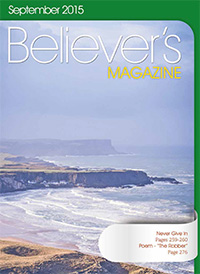The journey had commenced when the Lord left Judæa and travelled north to Galilee (Jn 4.3). It is clear that the Lord Jesus not only had the crowds in His heart, but also cared for individuals. He arrived at the city of Sychar, which was near to the ground that Jacob had given to his son Joseph (Gen 33.19). Jacob's well was still in use, and the disciples had gone into the city to purchase food.
Alone, the Lord Jesus addressed a woman who had come to obtain water. There had been a long time of animosity between Jew and Samaritan, but, nevertheless, the Lord Jesus spoke to the woman. Is this an encouragement for us to speak to those who have a need to hear? How often do we feel that we have failed when we have had an opportunity of telling others of the gospel message? Let us consider how the Lord acted.
First He spoke to her, asking if she would give Him a drink of water (v.7). How simple that was. He interrupted her in a kindly manner. Such was the demeanour of the Lord that she had no fear of Him. Given the strong feelings between those who were from Samaria and those who were Jews she was surprised that He had even spoken to her. He overcame the difficulties of differing nationality.
Second, the Lord now spoke to the woman in order to tell her the importance of Him who was sitting at the well. On that basis He states, "If thou knewest the gift of God, and who it is that saith to thee, Give me to drink…" (v.10). He now tells her that He can provide "living water", a message that gives life from God.
Third, the woman challenges the Lord: "from whence then hast thou that living water?". He tells her that she has a choice to make (vv.13-14). Is it to drink of water that will only ease her for a moment of time or for water that will come from a "well of water" that will never be dry? The key centre of this conversation is the invitation to accept what the Lord is offering - "a well of water springing up into everlasting life". This issue now is clear. It is the question of enjoying everlasting life.
Fourth, the Lord now challenges the lack of integrity in the woman: "Go, call thy husband, and come hither" (v.16). This is a challenge which she saw immediately. Other women kept her at a distance, and it may be due to this that she came to draw water in the evening. Five men had been with her as a "husband", and presently the man who lived with her was not "married" to her. Gospel work today in like manner is often challenged by the lack of interest and low moral standards. These are treated as being of no importance. Spreading the gospel presently requires carefulness to deal with many difficult issues and relationships.
Fifth, the Lord Jesus addresses the vital subject: "Woman, believe me…." (v.21). This is the issue that determines where we will be when life in this world is over. So crucial is this that it is spoken in this manner in John's Gospel. It is clear that this woman had a desire to tell others and she was so determined that she left her waterpot as she recognised that which she had heard and needed to spread abroad. The conversation that one woman had with the Lord so brought about the interest of others that "They went out of the city, and came unto him" (v.30).
In service of the gospel have we spoken to many or to few? Is the responsibility not on us? Ought we not always be ready to speak of the gospel, and always have by us the tracts and booklets that can be helpful?
The woman had been immoral but, instructed by the Lord, had become anxious to let others know of Him. Many men and women in this day live as she did. Little wonder that she said, "Come, see a man, which told me all things that ever I did" (v.29). May we take every opportunity to tell others of Him who is "the Christ".









